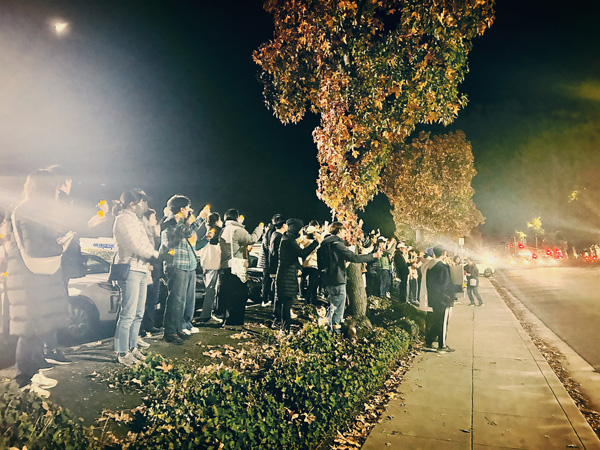South Korea in crisis as martial law sparks political turmoil and protests

[In Sunnyvale, California, on December 6th, 2024, protestors took to the streets against Yoon Suk Yeol. Photo Credit to Joseph Shin]
In a move that sent shockwaves through the nation, South Korea faced a seismic political event on December 3, 2024, when President Yoon Suk Yeol declared martial law, sparking nationwide outrage and raising concerns about the nation's democratic stability. The drastic measure came amidst escalating tensions between the president and opposition parties, marking one of the most severe political crises in the country’s modern history.|| In a televised address, President Yoon justified the declaration as necessary to safeguard South Korea's constitutional order, claiming opposition leaders had conspired with North Korea to destabilize his administration. He labeled them as engaging in “anti-state activities.” Military forces seized control through a martial law decree, deploying heavily armed troops to key government sites, including the National Assembly. The sweeping order imposed a ban on political activities, restricted protests, and limited press freedoms. The declaration triggered immediate condemnation from opposition leaders, who denounced what they called an unconstitutional power grab. Within hours, thousands of demonstrators gathered outside the National Assembly to protest against the decree. Chants of “No martial law!” and “End the dictatorship!” echoed through the streets, as the public demanded accountability and the restoration of democratic principles. Despite the military’s presence, lawmakers managed to convene an emergency session. South Korean Parliament rejects the Martial Law Declaration,as 190 out of 300 members voted to nullify the president’s decree, underscoring the resilience of South Korea's democratic institutions. This turn of events marked a significant rejection of executive overreach, but the crisis exposed deeper political and social fractures within the nation, analysts say. Critics have viewed the martial law declaration as a desperate attempt by President Yoon to consolidate power amid plummeting approval ratings and corruption scandals, according to opposition leaders. For many South Koreans, the move evoked painful memories of the nation’s authoritarian past, as the country last witnessed martial law in 1979 under military dictatorship.| The political crisis has extended beyond South Korea’s borders. Reports indicate that protests have erupted in diaspora communities worldwide. One such event was a candlelight vigil held in Sunnyvale, California, where, on December 6, 2024, over 150 people—including students, teachers, and clergy—gathered in front of a Korean market to demand President Yoon’s impeachment.
The protestors sang “March for the Beloved,” a song widely recognized as a symbolic anthem of resistance, and held banners calling for the president’s resignation. Passing cars honked in solidarity, demonstrating a shared conviction among Korean-Americans to uphold democratic values. Similar scenes of solidarity unfolded in cities across the globe, amplifying calls for President Yoon’s removal. In South Korea, more than a million people gathered for mass candlelight vigils in front of the National Assembly. Citizens from all walks of life - students, workers, families, and religious leaders - united in their opposition, demanding accountability and the preservation of democratic norms. Economic concerns, such as rising living costs and inequality, have added to the growing dissatisfaction with the administration, further fueling public anger. The opposition, led by Democratic Party leader Lee Jae Myung, has moved to initiate impeachment proceedings against President Yoon. As the vote approaches, the nation finds itself at a crossroads, grappling with fundamental questions about the balance of power, the role of the military, and the future of its democracy. Events that unfolded on December 3, 2024, have underscored both the fragility and strength of South Korea’s democratic institutions, leaving the country and its people at a crossroads as they determine their political trajectory in the weeks ahead.

- Joseph Shin / Grade 11 Session 7
- Valley Christian High School

![THE HERALD STUDENT REPORTERS [US]](/assets/images/logo_student_us.png)
![THE HERALD STUDENT REPORTERS [Canada]](/assets/images/logo_student_ca.png)
